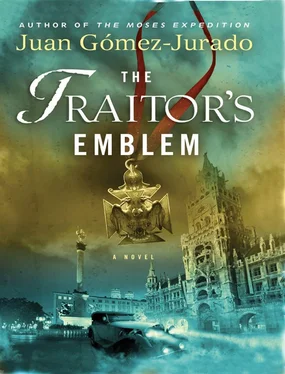Juan Gomez-Jurado - The Traitor's emblem
Здесь есть возможность читать онлайн «Juan Gomez-Jurado - The Traitor's emblem» весь текст электронной книги совершенно бесплатно (целиком полную версию без сокращений). В некоторых случаях можно слушать аудио, скачать через торрент в формате fb2 и присутствует краткое содержание. Жанр: Триллер, на английском языке. Описание произведения, (предисловие) а так же отзывы посетителей доступны на портале библиотеки ЛибКат.
- Название:The Traitor's emblem
- Автор:
- Жанр:
- Год:неизвестен
- ISBN:нет данных
- Рейтинг книги:4 / 5. Голосов: 1
-
Избранное:Добавить в избранное
- Отзывы:
-
Ваша оценка:
- 80
- 1
- 2
- 3
- 4
- 5
The Traitor's emblem: краткое содержание, описание и аннотация
Предлагаем к чтению аннотацию, описание, краткое содержание или предисловие (зависит от того, что написал сам автор книги «The Traitor's emblem»). Если вы не нашли необходимую информацию о книге — напишите в комментариях, мы постараемся отыскать её.
The Traitor's emblem — читать онлайн бесплатно полную книгу (весь текст) целиком
Ниже представлен текст книги, разбитый по страницам. Система сохранения места последней прочитанной страницы, позволяет с удобством читать онлайн бесплатно книгу «The Traitor's emblem», без необходимости каждый раз заново искать на чём Вы остановились. Поставьте закладку, и сможете в любой момент перейти на страницу, на которой закончили чтение.
Интервал:
Закладка:
Which meant that Paul had already seen traces of blood, but never at the entrance to the house where he lived. And although there wasn’t much, it was coming from beneath the big oak door.
With any luck Jurgen has fallen on his face and knocked out all his teeth, thought Paul. Maybe that way he’ll give me a few days’ peace. He shook his head sadly. He didn’t have that kind of luck.
He was only fifteen, but already a bitter shadow had been cast on his heart, like clouds blocking the sluggish mid-May sun. Half an hour earlier, Paul had been lazing around among the bushes of the Englischer Garten, glad to be back at school after the revolution, though not so much for the lessons. Paul was always ahead of his classmates, and of Professor Wirth, too, who bored him immensely. Paul read everything he could get his hands on, gulping it down like a drunk on payday. He only feigned attention during lessons, but always ended up top of the class.
Paul didn’t have friends, however hard he tried with his classmates. But in spite of everything, he did enjoy school, because the hours of lessons were hours spent away from Jurgen, who attended an academy where the floors weren’t made of linoleum and the edges of the desks weren’t chipped.
On his way home Paul always took a turn around the Garten, the largest park in Europe. That afternoon it seemed almost deserted, even by the ubiquitous red-jacketed guards who would reprimand him whenever he strayed off the path. Paul made the most of this opportunity, and took off his shabby shoes. He liked to walk barefoot on the grass, and bent down distractedly as he went, picking up a few of the thousands of yellow pamphlets that the Freikorps planes had dropped over Munich the previous week, demanding the Communists’ unconditional surrender. He threw them in the bin. He would gladly have stayed to clear up the whole park, but it was Thursday, and he had to polish the floor of the fourth story of the mansion, a task that would occupy him until dinnertime.
If only he weren’t there… thought Paul. Last time he locked me in the broom cupboard and poured a bucket of dirty water onto the marble. Good thing Mama heard me shouting and unlocked the cupboard before Brunhilda found out.
Paul wanted to remember a time when his cousin hadn’t behaved like that. Years ago, when they were both very small and Eduard would hold their hands and take them to the Garten, Jurgen used to smile at him. It was a fleeting memory, almost the only fond memory of his cousin that remained. Then came the Great War, with its orchestras and parades. And off marched Eduard, waving and smiling as the truck that carried him away gathered speed and Paul ran alongside it, wanting to march with his big cousin, wishing he were sitting beside him sporting that impressive uniform.
For Paul, the war had consisted of the news he read each morning posted on the police station wall, which was on his way to school. Frequently he had to slip through a thicket of legs-something he never found difficult, as he was as thin as a rake. There he read delightedly about the advances of the Kaiser’s Army, which daily took thousands of prisoners, occupied cities, and expanded the borders of the Empire. Then in class he would draw a map of Europe and amuse himself by imagining where the next great battle would take place, and wondering if Eduard would be there. Suddenly, and quite without warning, the “victories” started happening ever closer to home, and the war dispatches almost always announced “a return to the position of security originally envisaged.” Until one day a huge poster announced that Germany had lost the war. Underneath was a list of the price that would have to be paid, and it was a very long list indeed.
Reading that list and the poster, Paul had felt as if he’d been deceived, cheated. Suddenly there was no cushion of fantasy to mitigate the pain of the increasing number of thrashings he received from Jurgen. The glorious war would not wait for Paul to grow up and join Eduard at the front.
And there was certainly nothing glorious about it at all.
Paul stood there for a while, looking at the blood at the entrance. In his mind he rejected the possibility that the revolution had started again. Freikorps squads were patrolling the whole of Munich. This puddle seemed fresh, however, a small anomaly on the great stone whose steps were large enough to fit two men lying end to end.
I’d better hurry. If I’m late again, Aunt Brunhilda will kill me.
He debated a little longer between fear of the unknown and fear of his aunt, and the latter prevailed. He took the little key to the service entrance from his pocket and let himself into the mansion. Inside, everything seemed quiet enough. He was approaching the staircase when he heard voices from the main living quarters of the house.
“He slipped as we were climbing the steps, madam. It’s not easy to hold him up, and we’re all very weak. It’s been months and his wounds keep reopening.”
“Incompetent fools. No wonder we lost the war.”
Paul crept across the main entrance hall, trying to make as little noise as possible. The long bloodstain that ran under the door narrowed into a series of drips that led toward the largest room in the mansion. Inside, his aunt Brunhilda and two soldiers were leaning over a sofa. She kept rubbing her hands together until she realized what she was doing and then hid them in the folds of her dress. Even though he was hidden behind the door, Paul couldn’t help quaking with fear when he saw his aunt like this. Her eyes were like two thin gray streaks, her mouth was twisted into a question mark, and her authoritative voice trembled with rage.
“Look at the state of the upholstery. Marlis!”
“Baroness,” said the servant, approaching.
“Go and fetch a blanket, quickly. Call the gardener. His clothes will have to be burned, they’re covered in lice. And someone tell the baron.”
“And Master Jurgen, Madam Baroness?”
“No! Especially not him, you understand? Is he back from school?”
“He has fencing today, Madam Baroness.”
“He’ll be here any moment. I want this catastrophe sorted out before he returns,” Brunhilda ordered. “Go!”
The servant rushed past Paul, her skirts swishing, but he still didn’t move, because he had spotted Eduard’s face behind the legs of the soldiers. His heart began to beat faster. So that was who the soldiers had carried in and laid down on the sofa?
Good God, it was his blood.
“Who is responsible for this?”
“A mortar shell, madam.”
“I know that much already. I’m asking why you’ve brought my son to me only now, and in this state. It has been seven months since the war ended, and not a word of news. Do you know who his father is?”
“Yes, he’s a baron. And Ludwig here is a bricklayer, and I’m a grocer’s assistant. But shrapnel has no respect for titles, madam. And the road from Turkey was a long one. You’re lucky he’s back at all; my brother won’t be coming back.”
Brunhilda’s face turned livid.
“Get out!” she hissed.
“That’s nice, madam. We return your son to you and you throw us out into the street without so much as a glass of beer.”
A glimmer of remorse might perhaps have crossed Brunhilda’s face, but it was overshadowed by rage. Speechless, she raised a trembling finger and pointed toward the door.
“Piece of aristo shit,” said one of the soldiers, spitting on the carpet.
Reluctantly they turned to leave, their heads down. Their sunken eyes filled with weariness and disgust, but not surprise. There was nothing, thought Paul, that could shock these men now. And when the two men in large gray greatcoats moved out of the way, Paul finally understood the scene.
Читать дальшеИнтервал:
Закладка:
Похожие книги на «The Traitor's emblem»
Представляем Вашему вниманию похожие книги на «The Traitor's emblem» списком для выбора. Мы отобрали схожую по названию и смыслу литературу в надежде предоставить читателям больше вариантов отыскать новые, интересные, ещё непрочитанные произведения.
Обсуждение, отзывы о книге «The Traitor's emblem» и просто собственные мнения читателей. Оставьте ваши комментарии, напишите, что Вы думаете о произведении, его смысле или главных героях. Укажите что конкретно понравилось, а что нет, и почему Вы так считаете.












